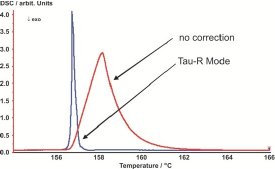Differential Scanning Calorimetry (DSC) is a method which determines the difference in heat flow between a sample and a reference. A closer look at the resulting curve, however, makes it clear that the temperature behavior and peak characteristics shown are not a true reflection of the sample behavior. This is because the DSC curve not only contains the desired information about the sample, but is also distorted by misleading information stemming from the instrumentation.
If thermal contact is poor, a sample will need more time for melting (thus yielding a wider, lower peak) than if thermal contact is good (a sharp, narrow peak). The slope of the measured signals is a function of the thermal resistance, R. The heat flow signal measured with DSC reflects not only the heat released (or consumed) by the sample, but also the heat which is dependent on the instrument's heat transfer.

Get Undistorted DSC Results with NETZSCH Tau-R Mode
In order to correct this distortion, NETZSCH has developed the "Tau-R Mode". The instrument's influence on the peak's shape can now be mathematically eliminated. This yields undistorted information about the sample and the processes taking place during phase transformation. The sharp peak in the DSC curve is an improvement provided by the Tau-R Mode: The signal shows a steep ascent on the left slope and falls to zero again immediately after reaching the maximum. Optimizing conditions with this software feature improves confidence in the evaluation of onset and peak temperatures.